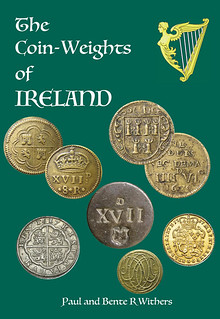
PREV ARTICLE
NEXT ARTICLE
FULL ISSUE
NEW BOOK: THE COIN-WEIGHTS OF IRELANDPaul and Bente Withers have published a new book on the coin weights of Ireland. Congratulations! -Editor
Coins, medals and tokens are often collected because they are miniature works of art, but in addition to that, the legends, inscriptions and portraits on coins of the ancient world give us information as diverse as rulers and their names, when they reigned, political and economic alliances of nations, contemporary fashions and hairstyles, architecture, mints, governmental and regional control, religion and more. Much the same holds true for medieval and modern coins. Coin-weights, however, are slightly different, presenting challenges that coins do not. For example, there are several kinds. Basically there are those that tell us exactly what the coin should weigh, whilst others indicate a minimum weight, below which it was worth only its scrap value. A third type are used to measure by how much precious metal the coin was light. In some ways coin-weights are less revelatory, but in others their collection and study can sometimes tell us more about national and international economies, and economics than the coins themselves. Irish coin-weights are really revealing in this respect in that they, and the proclamations legitimising them, are solely for foreign silver and gold coins, which at that time comprised nearly all of the circulating medium in Ireland, as no native silver or gold coins were struck in Ireland after the silver issues of James I, apart from the emergency issues such as the Inchiquin and Ormonde coinages struck during the Eleven Years' War that took place in Ireland in the 1640s and 1650s. The most interesting are those termed ‘monetiform' coin-weights which have on them the design of the coin they were intended to weigh. The majority of the population of Europe, until just over a century ago were illiterate and innummerate, so to indicate which weights were to weigh which coins, most coin-weights were generally made to look like the coins. 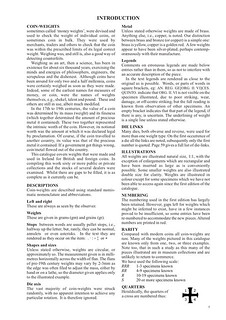 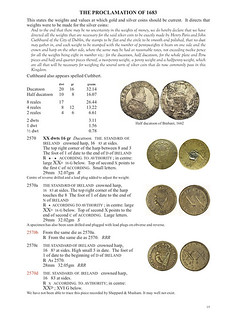 The first thing that readers will notice is that the cover and most of the illustrations are printed in high definition colour, something that would have been prohibitively expensive 26 years ago. Closer examination will reveal that recent improvements in technology have given us the ability to match the catalogue text more closely in size and font to the original item. Observations of many hundreds more weights have meant that corrections have been possible. Many of the weights we recorded 40 years ago were known from a single example, and some of those were struck off-centre, thus we could not be sure of the legend. Many were weakly struck from worn dies, so we were also unsure of the punctuation. Some of the weights we now have listed have had their legends and punctuation confirmed from three or more specimens. Then there were errors that were entirely our own fault – we had, in one instance, failed to observe that the legend did not read THE STANDARD OF IRELAND, but THE STANDARDARD OF IRELAND... How could the engraver make such a blunder, and we not notice it? Well, it was a worn weight and much of the legend was invisible due to off-centre striking, complicated by file marks due to the flan having been adjusted. There are also those mistakes that the use of computers cause. You copy a similar catalogue entry to make a new one, and paste it elsewhere into the document, the phone rings and whilst distracted, you forget to delete, or change that part of the legend you intended to alter. We have corrected several such errors. Many previously unlisted items (71) have turned up. Two items in particular deserve mention: the first is one which shows that weight production was not limited to Dublin and Cork, but extended also to Limerick; and that coin-weights made in Dublin, were countermarked by an Ulster seller. 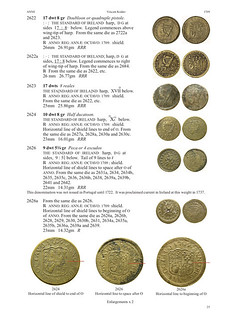 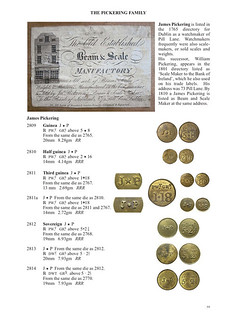 Three further decades of experience in numismatics, photography, typesetting and new technology have somewhat refined our techniques and abilities in using those technologies. With all of these improvements, you might ask why some of the illustrations are still in black and white – the simple explanation is that the photos were taken 40 years ago, and whilst we still have the original b&w record photographs, many of the then owners of those weights have now, sadly, passed on, or we may have lost contact with them. Undoubtedly, new previously unseen weights will turn up, and further improvements can be made in the future, but we hope that this edition will be the standard reference for many decades to come. Paul & Bente Withers
Here are some of the details from the web site. -Editor Nearly 400 items listed and illustrated. Rarity ratings. Many previously unpublished weights. Well illustrated, mostly in colour. Paperback, A4 (210 x 297mm) 68 pages. Price: £25.00 For more information, or to order, see:
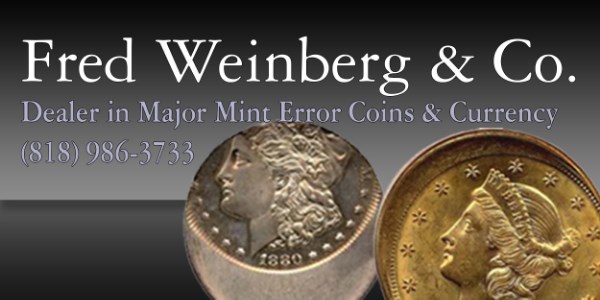 Wayne Homren, Editor The Numismatic Bibliomania Society is a non-profit organization promoting numismatic literature. See our web site at coinbooks.org. To submit items for publication in The E-Sylum, write to the Editor at this address: whomren@gmail.com To subscribe go to: https://my.binhost.com/lists/listinfo/esylum All Rights Reserved. NBS Home Page Contact the NBS webmaster 
|
